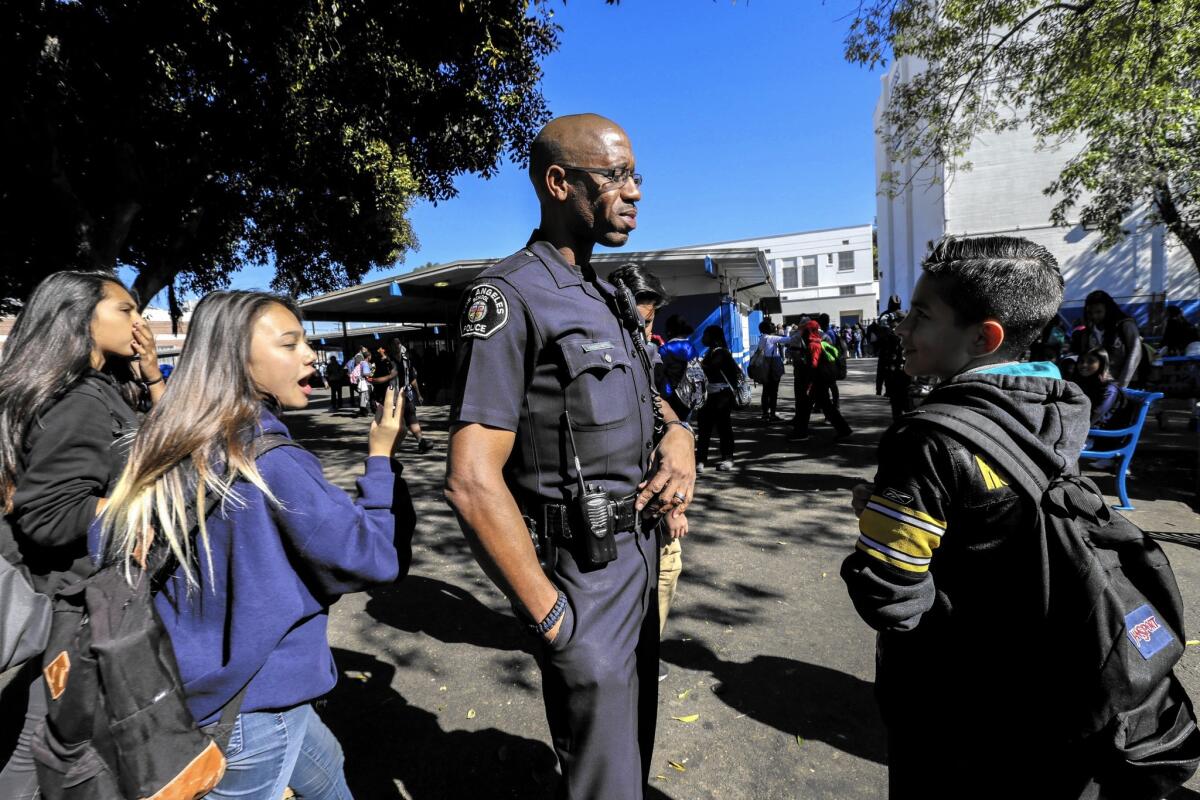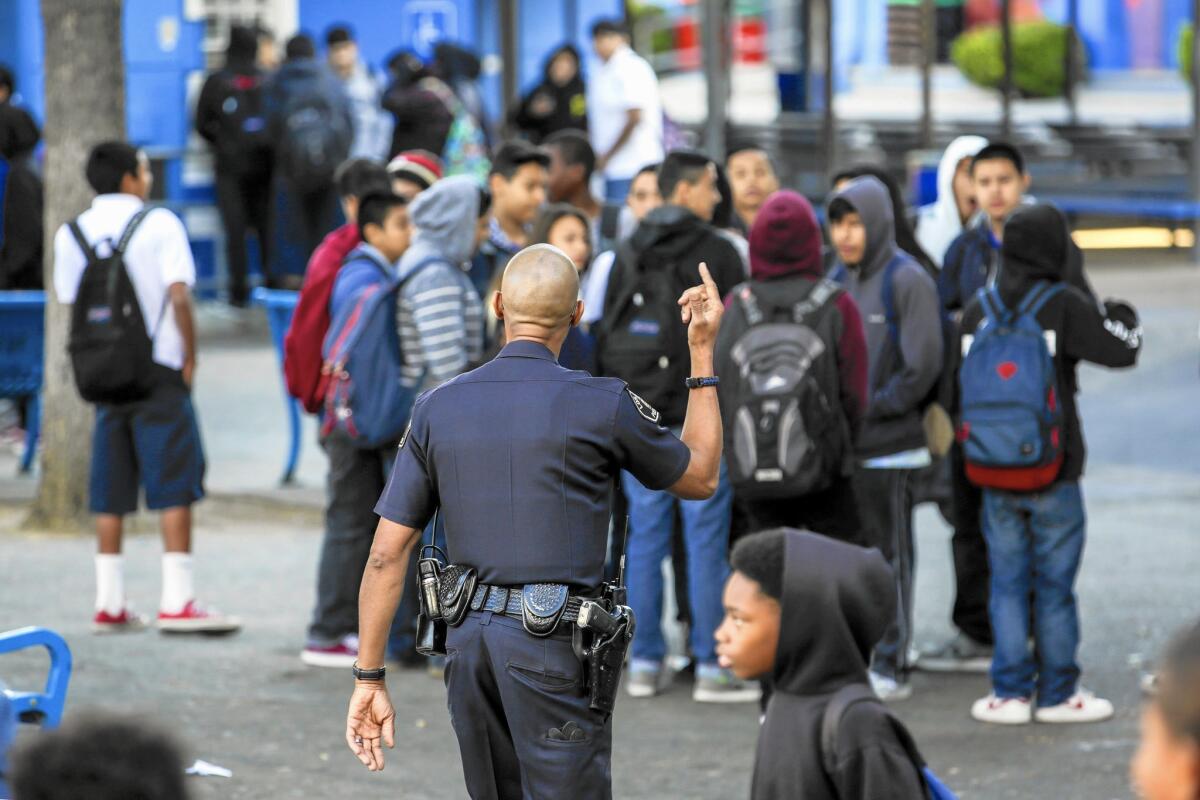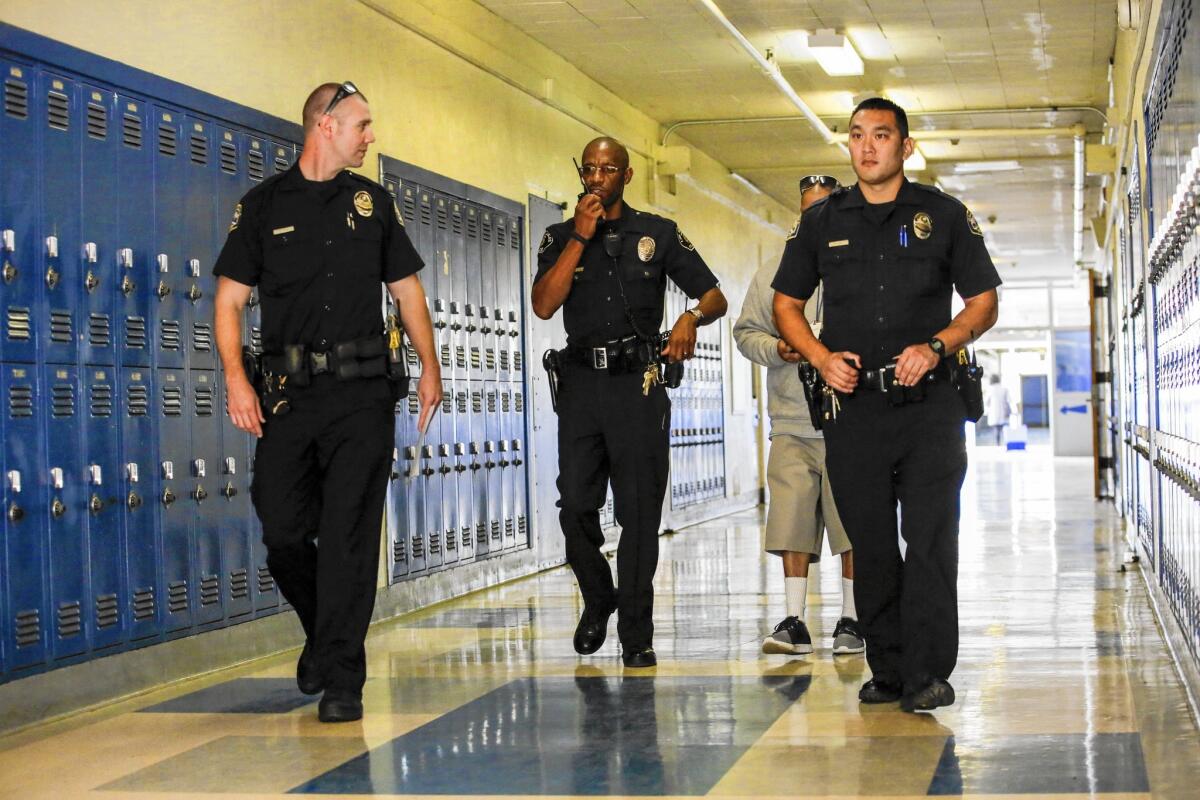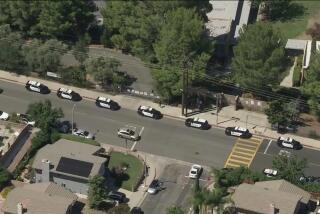L.A. Unified sees success in counseling rather than arresting truants and kids who fight

L.A. Unified sees success in counseling rather than arresting truants and kids who fight.
Just before 8 a.m. at Peary Middle School in Gardena, a boy was refusing to leave his motherâs car. The school police officer on duty could have barked orders at him to get to class. He could have written him up for truancy. He could have forcibly moved him â as a South Carolina police officer did to a student last month, sparking a national uproar.
But Los Angeles Unified School Police Officer Henry Anderson did none of that. Instead, he tried to cajole the boy with friendly persuasion and ever-so-subtle appeals to guilt.
âWhatâs up, man?â the lean and lanky officer said, greeting the boy. âYouâre all dressed up and ready to go. Câmon.â
The Timesâ new education initiative to inform parents, educators and students across California >>
Anderson told the boy that heâd be bored at home. He told him he would trouble his mother. He called in a school administrator to help. In the end, the mother decided to take her son home and try again later.
âInstead of sending kids to court on tickets, weâre using diversion programs to counsel them and talk about why theyâre truant,â said Anderson, a 20-year school police veteran. âWe try to work with parents. Our main goal is to get the kids to school.â
Anderson is one of 405 sworn L.A. Unified police officers who, along with more than 125 safety officers, make up the nationâs largest independent school police force. Across the nation, campus officers are facing criticism that theyâre pushing children into a âschool-to-prison pipelineâ with citations, arrests and excessive force for issues that could be resolved by other means. National studies show that one arrest doubles a studentâs odds of dropping out.

âWe try to work with parents. Our main goal is to get the kids to school,â says Officer Henry Anderson, a 20-year veteran school police officer.
But in L.A. Unified, police Chief Steven Zipperman and his force worked with community organizations to launch a landmark reform last year that has ended citations for most fights, petty thefts and other minor offenses in favor of redirection into counseling programs. In the last year, he said, about 460 students who would otherwise have been cited were sent to counseling instead, with only 7% failing to complete their programs.
The reform builds on earlier efforts to end tickets for truancy, which resulted in a steep decline in citations to 3,499 in 2013 from 11,698 in 2010. In the last year, he said, about 460 students who would otherwise have been cited were sent to counseling instead, with only 7% failing to complete their programs.
All told, more than 770 students were sent to counseling in lieu of tickets for truancy, minor offenses and misdemeanor battery charges during the 2014-15 school year.
Manuel Criollo of the Community Rights Campaign, a Los Angeles civil-rights organization that helped forge the new approach, has praised police for embracing the reforms. But he advocates eliminating all law-enforcement officers from campus and using the $59 million annual police budget for more counselors, social workers and other student support staff instead.
âWhile our organizing has brought greater protection for [district] students from being criminalized, South Carolina shows us what can be the consequences of having police in school,â Criollo said. âThey donât belong in our schools.â
Zipperman, however, said campus police were essential.
âWeâre here to ensure the safety of students, teachers and staff,â he said. âOur school police officers arenât storm troopers coming onto campus. These are officers who interact with the kids every day. They are role models.â
At Peary, a campus of 1,500 largely low-income minority students, Anderson describes himself as not only an officer but also a counselor, parent and friend. His multiple roles were apparent during a recent visit.
Roaming the campus throughout the day, Anderson called out to students, asking what they had for breakfast and joking about football. A group of students surrounded him, asking questions about his sharp blue uniform, metallic badge and heavy belt holding his black holstered gun.
A scowling boy told the officer that a girl had hit him. Anderson took out his notebook, wrote down the girlâs name and promised to talk to her. âDonât let any girl get you upset,â he said.
Shortly before lunch, he mediated a conflict between two boys and their families. Sporting two blue band-aids covering cuts sustained after being pushed to the ground, sixth-grader Justin Burdette told Anderson that seventh-grader Isaiah Cerpa hit him when Justin tried to break up a fight between Isaiah and a smaller student. Isaiah admitted guilt but said that Justin had insulted his mother.
âWhen you put your hands on someone, thatâs battery and you could go to jail,â Anderson told Isaiah. âIf it happens again you might get arrested. If you have problems with anyone, come see me or the dean. Donât take it into your own hands.â
Isaiah nodded, then at Andersonâs prompting apologized to Justin and the parents. Both sets of parents said they were satisfied with the outcome.
Later, Isaiah came back to Andersonâs office.
âYou have any advice to get away from getting into trouble?â the boy asked him.
Anderson told him to stay away from bad influences, including his friends who hop the school fence and sneak off to the snack store.
âDonât hop with them. You know right from wrong. Anytime you do something wrong, thereâs going to be a consequence. Why even take that chance? You have any problems with anything, weâll help you get through it. The last thing I want to do is arrest you and write a ticket.â
Isaiah smiled. âThank you,â he said.
Anderson, a 48-year-old South Los Angeles native who attended University High, said he was drawn to law enforcement after visiting courtrooms as a messenger in a law firm. After completing police training, he applied to seven agencies; L.A. Unified was the first to call.
Over the years, he has dealt with students who have smoked marijuana, stolen cellphones and laptops, assaulted others and texted sexual photos of schoolmates. He has also handled difficult parents who he says are failing to teach their children responsibility, or give up on them completely and ask him to throw them in jail.
âOur job isnât easy,â he said. âWe deal with kids with a lot of emotional problems. We deal with defiant kids who wonât listen to you if you donât have a gun and a badge, and even then they may not listen.â

Los Angeles Unified School Police Officer Henry Anderson on his beat at Peary Middle School in Gardena.
But the job brings joy, he said â especially when he can help others out. In one case, he used his rapport with students to find out who stole a teacherâs cellphone. The perpetrator had denied his involvement to the teacher and his parents but confessed to Anderson after the officer said it was probably caught on camera (it wasnât) and if he came clean Anderson could help him avoid an arrest.
During his six years at Peary, he has come to know many of the students: the kid with a âmouth on him.â The âlittle instigator.â The âgood kid who makes dumb decisions.â And they know him.
âHe be cool about problems â he doesnât yell. He gives us warnings,â says Jaquazz Harvey, 13.
In the deanâs office, several boys suspected of throwing water balloons at passing cars gave Anderson a thumbs up. Ivan Andrew Luna, an eighth-grader, said Anderson listens to everyoneâs side of the story with patience.
âI feel safer with him around school,â Ivan said. âHe protects us.â
But not everyone agrees. âYou need to get them off campus,â one boy said of school police.
Before the day ended, Anderson would break up two schoolyard fights, counsel a girl about her rocky relationship with a teacher, gently chide a boy who left campus for the snack store and get tough when he needed to. He gave a stern talk to two boys about their treatment of a teacher that was caught on video.
âStay out of his face unless you want a problem â Iâm talking about a problem with me,â he told the boys.
But most of the time, Anderson projects himself as a positive, fatherly mentor, Principal Marva Patton says.

Officer Henry Anderson, middle, patrols Peary Middle School with two Gardena police officers. Starting last year, the district stopped citing for most fights, petty thefts and other minor offenses in favor of redirection into counseling programs
âHe shows the police in a different light â not as someone to fear but as someone to help you,â said Desdra Butler, an operations coordinator with the districtâs local office covering South L.A.
âI have 1,000 kids,â Anderson said. âI like them to feel I do care for them but they need to know theyâve got school rules to follow. â
As the day winded down, Anderson had a final task: telling parents that their children had gotten into scuffles that day. He assured them that the issues would be resolved. âWell, as long as itâs over,â one parent said.
Anderson headed back to his office, breaking into a grin.
âMade it through the day,â he said.
Twitter: @teresawatanabe
ALSO
Wheelchair stolen from girl without legs is returned to family
Driverless vehicles and the future of L.A. transportation
How LAPD vice is cleaning up K-townâs less savory side
More to Read
Sign up for Essential California
The most important California stories and recommendations in your inbox every morning.
You may occasionally receive promotional content from the Los Angeles Times.











